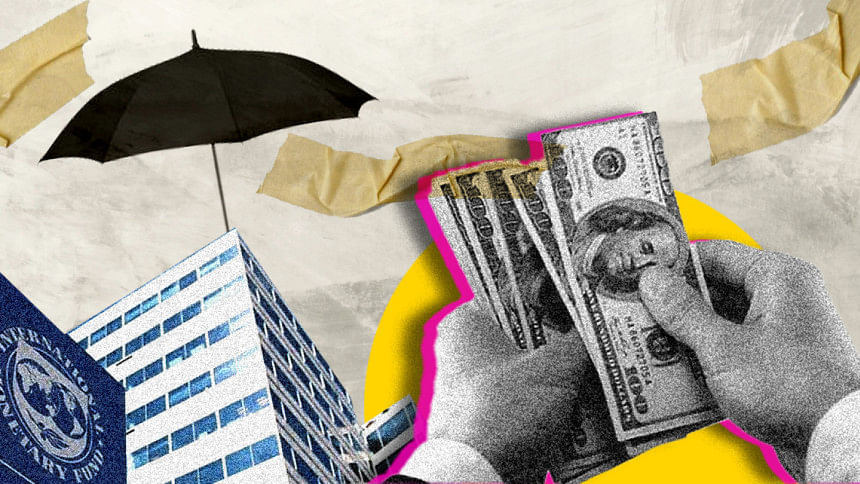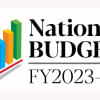How global economic governance entrenches dependence for countries like Bangladesh

In the first half of 2025, Bangladesh's economic headlines have swung between cautious optimism and deepening alarm: an IMF bailout, renewed negotiations with the World Bank, calls for foreign direct investment (FDI), and an unrelenting cost-of-living crisis. Beneath these surface-level developments lies a deeper structural entrapment—an architecture of global economic governance that continues to bind Bangladesh's future to externally scripted imperatives.
At the core of this system are the Bretton Woods institutions—the International Monetary Fund (IMF) and the World Bank—established in 1944 to help stabilise the post–Second World War economic order. Add to them the World Trade Organization (WTO), created in 1995. Together, these institutions are now acting as enforcers of the Washington Consensus: policy prescriptions promoting austerity, liberalisation, and privatisation, often at the expense of national sovereignty and social equity. Today, this "Unholy Trinity" operates in concert with powerful actors such as the G7, World Economic Forum (WEF), and transnational corporations (TNCs), colluding closely with domestic enablers from Bangladesh's political, business, and bureaucratic elites.
This ensemble—let's call them the Unholy Trinity Plus—sustains a neo-colonial economic order couched in the language of development, reform, and global integration, essentially reproducing dependence in the Global South. Despite Bangladesh's impressive socio-economic resilience, it remains ensnared in this ill-conceived global architecture, its sovereignty gradually mortgaged for short-term liquidity and long-term indebtedness.
The mirage of development
From Latin America to sub-Saharan Africa, IMF stabilisation packages in the 1980s and 1990s ushered in waves of austerity, liberalisation, and deregulation. These policies decimated public services, weakened state capacity, and widened inequality. Bangladesh now treads a similar path.
In June 2025, the IMF disbursed an additional SDR 567 million (equivalent to around $884 million under the extended credit facility and extended fund facility) and $453 million via the rapid financing instrument, totalling $4.1 billion in support—a sum that, ironically, is dwarfed by the record $30 billion remitted by Bangladeshi migrant workers in FY24-25. These remittances have long sustained the economy without conditionalities, yet those who send them remain voiceless in shaping the very policies that govern their families' lives.
In contrast, a staff-level agreement between the IMF and Bangladesh in May 2025 unlocked $1.3 billion, contingent on tax reform and adopting a crawling-peg exchange rate—a mechanism that allows the taka to gradually depreciate against the dollar, making imports more expensive and fuelling inflation. These reforms aim to reassure global investors and stabilise macroeconomic indicators, but they do so at the cost of household budgets and domestic economic autonomy. For ordinary Bangladeshis, these abstractions translate into VAT hikes, fuel price deregulation, and a weakening taka—a recipe for inflation, wage stagnation, and daily hardship. Although the IMF's tone has softened, its approach still draws from the structural adjustment playbook, prioritising macroeconomic targets over social well-being.
The World Bank continues to couch its interventions in the lofty rhetoric of poverty alleviation and capacity building. But its lending in Bangladesh prioritises infrastructure and energy sectors, areas historically prone to elite capture. The Padma Bridge controversy exemplifies this dynamic: the bank withdrew support over corruption allegations, delaying the project amid further opacity. Despite renewed support, such as the $850 million package signed in April 2025 for port modernisation and social safety nets, the risk of reinforcing elite-controlled development circuits remains high.
Meanwhile, the WTO, though less visible in public discourse, plays a crucial role in entrenching Bangladesh's position in global value chains. Its trade rules and intellectual property regimes favour developed countries. In the ready-made garments (RMG) sector, billions in export earnings are siphoned off by Western brands. Bangladesh provides cheap labour, tax holidays, and lax regulation; buyers reap the lion's share of the margins. The 2013 Rana Plaza collapse exposed the human cost of this bargain. Reforms since then have been piecemeal and largely cosmetic.
Local enablers: The complicit elite
The Unholy Trinity Plus does not operate in a vacuum. It depends on local actors to implement and legitimise its agenda. In Bangladesh, this role is played by a comprador elite: politically connected business families, technocratic bureaucrats, ruling party loyalists, and segments of the NGO sector closely tied to donor agendas.
This elite class profits from managing dependency. They speak the language of Sustainable Development Goals (SDGs), attend Davos forums, and promise reform in exchange for loans. Behind the scenes, however, they benefit from capital flight, subsidised loans, tax exemptions, and privatisation of public goods. Between 2009 and 2018, Bangladesh lost an estimated $8.27 billion annually to illicit financial flows, according to Global Financial Integrity. While public debt is incurred in the name of development, its proceeds are often offshored, and its costs socialised.
This elite choreography sanitises the surrender of sovereignty. When the IMF demands fuel price rationalisation, it is the poor who queue for hours or go hungry. When the World Bank insists on fiscal consolidation, public universities and healthcare facilities suffer. Meanwhile, the elite fly first class, build shopping malls, and send their children abroad.
Sovereignty for sale
Bangladesh is not alone in this predicament. Across the Global South, the postcolonial dream of economic self-determination has given way to regimes of permanent indebtedness. As anthropologist David Graeber argued in Debt: The First 5,000 Years, debt is not just economic—it is moral and political. Debt historically functions as a tool of domination and social control, enforcing hierarchies and subjugation. It creates obligations: the debtor must comply; the creditor retains control.
Today, this power dynamic is institutionalised through global financial governance, where policies are shaped not by democratic consensus but by imperatives of debt repayment. The IMF is not merely a lender of last resort but a de facto policymaker and enforcer. The World Bank is an ideological enforcer, and the WTO is a gatekeeper for global capital.
Bangladeshi policymakers often claim they have "no alternative." But this is less a material inevitability than a lack of political will. Alternatives exist: regional currency swaps, South–South cooperation, wealth taxes, capital controls, and investment in domestic food and energy security. What is missing is the courage to defy global orthodoxy.
The FY2025–26 budget: Dependency continued
The FY25-26 budget, totalling Tk 7.90 trillion, offers little relief from this vicious cycle. Over Tk 1 trillion will be financed through foreign borrowing—an enormous sum, yet the composition, conditionalities, and repayment timelines remain largely undisclosed. Whether through multilateral lenders, bilateral partners, or private bond markets, the lack of transparency raises urgent questions about accountability and debt sustainability.
The budget closely follows donor prescriptions: tax and duty changes aligned with Least Developed Countries (LDC) graduation requirements, emphasis on attracting FDI, and liberalised trade regimes.
Although framed as pragmatic, these priorities entrench the influence of the Unholy Trinity Plus. The budget downplays redistribution, slashes real spending on health and education, and reinforces a growth model reliant on foreign capital and policy tutelage.
Beyond reform: Towards structural change
This is not a call for isolationism or narrow economic nationalism. Bangladesh is embedded in global trade and cannot extricate itself overnight. But it must challenge the false binary of compliance versus collapse.
A shift is needed—from technocratic management to democratic sovereignty. This means reclaiming policy space to prioritise redistribution over GDP growth, public investment over elite enrichment, and livelihoods over loan conditionalities. It requires confronting elite impunity and demanding transparency in how public debt is negotiated, disbursed, and repaid.
Critics will call this utopian. But history suggests otherwise. Malaysia imposed capital controls during the 1998 Asian financial crisis. Ecuador audited and repudiated illegitimate debt under Rafael Correa. A new generation of economists and activists across the Global South calls for debt cancellation, reparations, and post-neoliberal development models.
Bangladesh should not remain a passive recipient of aid. It must become an agent of its own economic future.
The Unholy Trinity Plus—global lenders and their domestic collaborators—will not dismantle themselves. Too deeply entrenched in profit and power, they will continue reinforcing the status quo unless challenged from below. Citizens, civil society, independent intellectuals, and dissenting state voices must demand a different trajectory, one that reclaims democratic choice and prioritises the well-being of the many over the few.
In the long run, development cannot be outsourced or indefinitely borrowed. It must be wrested back—layer by layer, institution by institution—from those who have turned collective need into market opportunity. True sovereignty requires not just rejecting bad deals but reimagining development beyond debt and donor conditionalities.
Ironically, Bangladesh, more than most Global South countries, must pivot on the very regime of global finance it is pitted against, designed to benefit the Global North. This paradox—building national development on foundations that undercut national autonomy—is not only unsustainable; it is structurally unjust.
This vicious cycle must be replaced by a virtuous cycle grounded in self-reliance, equitable redistribution, and democratic accountability. Until then, each new loan is another link in the chain. Each promised reform, a rehearsal of a tired script. It would be overly optimistic to expect this paradigm shift without struggle, particularly when it brooks no delay. But if not now, when? If not us, who?
Dr Faridul Alam, a retired academic, writes from New York City, US.
Views expressed in this article are the authors' own.
Follow The Daily Star Opinion on Facebook for the latest opinions, commentaries and analyses by experts and professionals. To contribute your article or letter to The Daily Star Opinion, see our guidelines for submission.

 For all latest news, follow The Daily Star's Google News channel.
For all latest news, follow The Daily Star's Google News channel. 









Comments